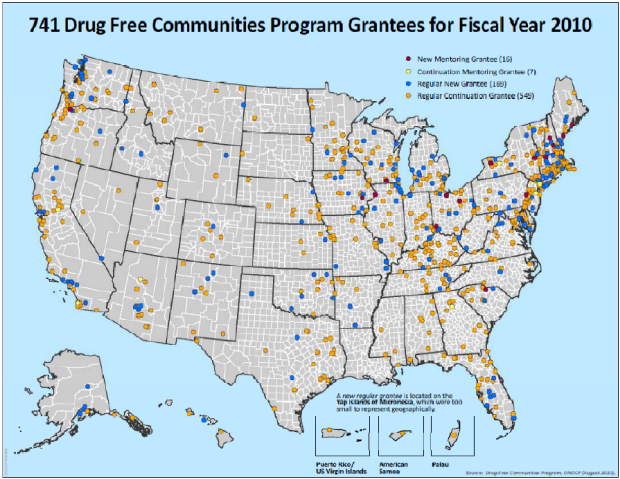Drug Free Communities Support Program
The Drug Free Communities Support Program (DFC), created by the Drug Free Communities Act of 1997, is the Nation’s leading effort to mobilize communities to prevent youth drug use. Directed by the Office of National Drug Control Policy (ONDCP), in partnership with the Substance Abuse and Mental Health Services Administration (SAMHSA), the DFC program provides grants to local drug-free community coalitions to increase collaboration among community partners and to prevent and reduce youth substance use.
Recognizing the fundamental concept that local problems need local solutions, DFC-funded coalitions engage multiple sectors of the community and employ a variety of strategies to address local drug problems.
For more information, visit the DFC Web site: www.WhiteHouseDrugPolicy.gov/dfc

Bringing Americans Together
The DFC program requires funded coalitions to include active participation from 12 sectors of the community:
- Youth
- Parents
- Law enforcement
- Schools
- Businesses
- Media
- Youth-serving organizations
- Religious and fraternal organizations
- Civic and volunteer groups
- Healthcare professionals
- State, local, and tribal agencies with expertise in substance abuse
- Other organizations involved in reducing substance abuse
The DFC program mobilizes more than 9,000 community coalition members throughout the United States, Puerto Rico, American Samoa, and Palau.
- Coalition members conduct ongoing community assessments to prioritize efforts to prevent and reduce youth drug use. These assessments are used to plan and implement data-driven, community-wide strategies.
- The DFC program requires funded coalitions to employ environmental strategies – broad initiatives aimed at addressing the entire community through the adaptation of policies and practices related to youth substance use. In so doing, coalitions can address the environment as a whole and get the most out of available resources.
Providing Support for Communities
- Since its inception, the DFC program has funded more than 1,600 community coalitions.
- Community coalitions that are at least six months old can apply for up to $125,000 per year for up to five years. Each coalition can apply for two cycles of funding, for a maximum of 10 years.
- To be eligible for DFC funding, coalitions must comply with a one-to-one match requirement, thus doubling the Federal investment. The matching amounts – whether inkind, donations, or cash – must come from non-Federal sources.
- In FY 2010, the DFC program funded grants in 741 communities in 49 States, the District of Columbia, Puerto Rico, American Samoa, Palau, and the Federated States of Micronesia.
- In FY 2010, $85.6 million funded 169 new grants, 549 continuation grants for coalitions already in a five-year cycle, and 23 mentoring grants, which provide funding to existing grantees so they can help new coalitions become strong enough to apply for DFC funding on their own.
- With the funding of the 2010 cycle, ten percent of DFC grants now represent organizations and communities working with Native American/American Indian populations, a 42 percent increase since 2007.
- DFC continues to expand in rural America. In FY 2010, 62 percent of DFC awards served communities who identify themselves as rural, up from 53 percent in 2009.
Download PDF
